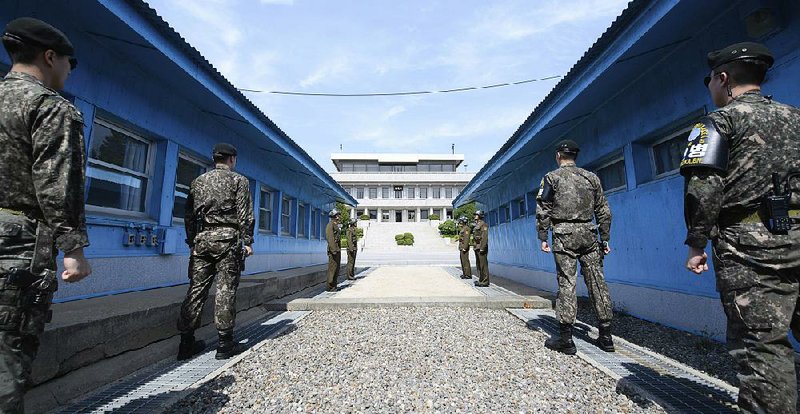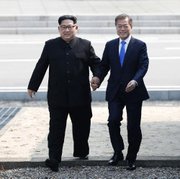GOYANG, South Korea -- Kim Jong Un today became the first North Korean leader to step foot in South Korea since the end of the Korean War, visiting the southern side of the Demilitarization Zone for a historic summit with President Moon Jae-in.
The steps were significant considering the heightened tensions of the past year -- when the United States, its ally South Korea and the North seemed at times to be on the verge of nuclear war as the North unleashed a torrent of weapons tests -- as well as the turbulent history of the rival Koreas, who fought one of the 20th century's bloodiest conflicts and even today occupy a divided peninsula that's still technically in a state of war.
"I feel like I'm firing a flare at the starting line in the moment of [the two Koreas] writing a new history in North-South relations, peace and prosperity," Kim told Moon as they sat at a table, its precise dimension of 2018 millimeters separating them, to begin their private talks.
Moon responded that there were high expectations that they produce an agreement that will be a "big gift to the entire Korean nation and every peace loving person in the world."
Earlier, both leaders smiled broadly as Moon grasped Kim's hand and led him along a red carpet into South Korean territory, where schoolchildren gave Kim flowers and an honor guard stood at attention for inspection, a military band playing traditional Korean folk songs beloved by both Koreas and the South Korean equivalent of "Hail to the Chief." Kim's sister, Kim Yo Jong, was by his side throughout the ceremony.
At one point Kim invited Moon to cross briefly back into the north with him before they returned to the southern side. They took a ceremonial photo facing the North and then another photo facing the South.
It remained unclear, however, if the leaders can make any progress in talks on the nuclear issue, which has bedeviled U.S. and South Korean officials for decades. North Korea's nuclear and missile tests last year likely put it on the threshold of becoming a legitimate nuclear power. North Korea claims it has already risen to that level.
Kim's news agency said the leader would "open-heartedly" discuss with Moon "all the issues arising in improving inter-Korean relations and achieving peace, prosperity and reunification of the Korean peninsula."
Today's meeting will be the clearest sign yet of whether it's possible to peacefully negotiate nuclear weapons away from a country that has spent decades building its bombs despite crippling sanctions and near-constant international opprobrium.
Expectations are generally low, given that past so-called breakthroughs on North Korea's weapons have collapsed amid accusations of cheating and bad faith. Skeptics of engagement have long said the North often turns to interminable rounds of diplomacy meant to ease the pain of sanctions, give it time to perfect its weapons, and win aid for unfulfilled nuclear promises.
Advocates of engagement say the only way to get a deal is for the Koreas to sit down and see what's possible.
The White House said in a statement that it is "hopeful that talks will achieve progress toward a future of peace and prosperity for the entire Korean Peninsula."
Moon, a liberal whose election last year ended a decade of conservative rule in Seoul, will be looking to make some headway on the North's nuclear bombs in advance of a planned meeting in several weeks between Kim and U.S. President Donald Trump.
South Korea, in disclosing some plans for the leaders' meeting, acknowledged Thursday that the most difficult sticking point between the Koreas has been North Korea's level of denuclearization commitment. Kim has reportedly said that he wouldn't need nuclear weapons if his government's security could be guaranteed and external threats, such as the nearly 30,000 heavily armed U.S. troops stationed in South Korea, were removed.
Trump told Fox & Friends Thursday morning that his tough approach toward the North, and now his willingness to engage with Kim, had reduced the risk of nuclear war. He contended that North Korea has "given up denuclearization, testing, research" and that "we're going to close different sites."
North Korea recently announced that it will shutter its nuclear test site and suspend nuclear and intercontinental ballistic missile tests, and Kim has indicated that he is ready to discuss denuclearization.
"I'm saying to myself wait a minute, all of these things he's given up and we haven't even really that much asked them," Trump said. He added: "We would have asked them, but they gave it up before I even asked."
In the interview, Trump also revealed more information about outgoing CIA Director Mike Pompeo's secret trip to North Korea this month, saying Pompeo wasn't supposed to meet with Kim but that they ended up talking for more than an hour. Pompeo, who won Senate confirmation Thursday to become secretary of state, was the most senior U.S. official to meet a North Korean leader since 2000.
"They had a great meeting," Trump said, without revealing what they discussed.
Information for this article was contributed by Kim Tong-hyung, Hyung-jin Kim, Eric Talmadge, Matthew Pennington and Zeke Miller of The Associated Press.
A Section on 04/27/2018

